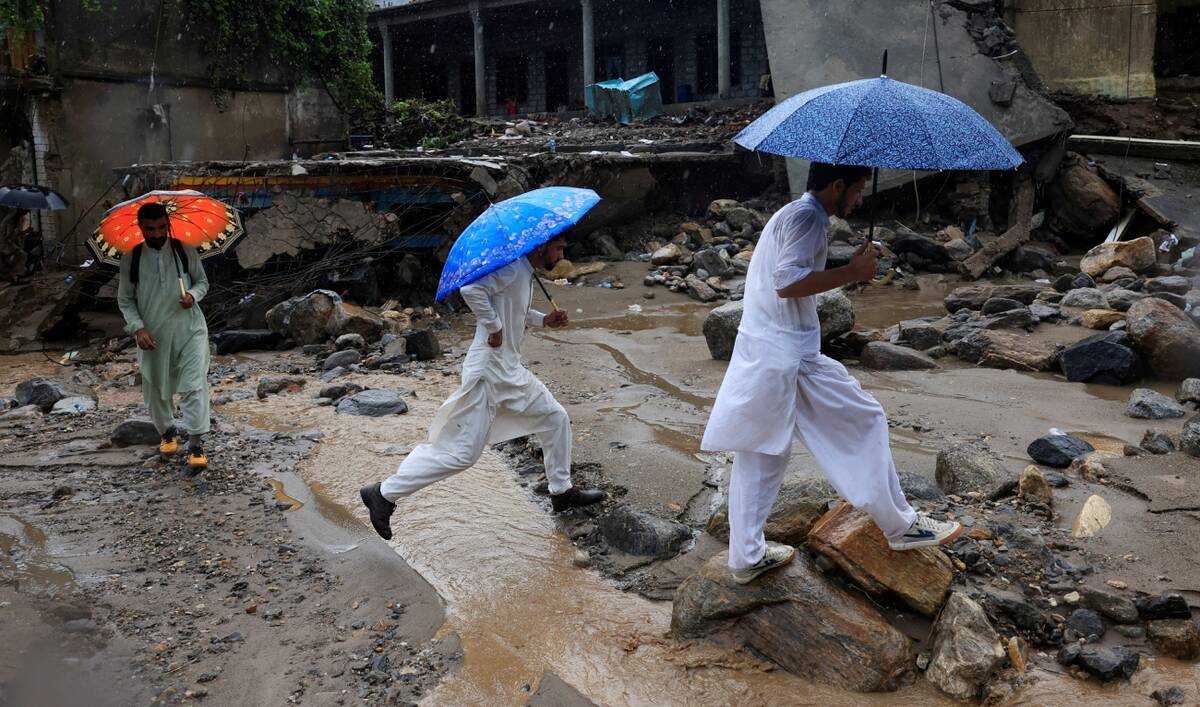LAHORE: Prominent Palestinian scholar Dr. Nimer Sultany honored one of Pakistan’s greatest poets, Faiz Ahmed Faiz, during a visit to Lahore this month, remembering his odes to the Palestinian cause and people and the friendships he developed with the territory’s poets and political leaders.
Sultany, who holds a Doctor of Juridical Science degree from Harvard Law School, was in Lahore on Sunday to attend the Faiz Festival, an annual cultural event that honors the life and work of Faiz Ahmed Faiz, one of Pakistan’s most renowned Urdu poets, intellectuals and political activists.
On Sunday, he appeared on a panel called ‘Lahu Ka Parcham: Palestine-Everyday Battles’ in conversation with three young Palestinian students currently enrolled at Pakistani universities. The panel was hosted by Dr. Osman Siddique, an author and law professor at the Lahore University of Management Sciences.
“I’m very pleased to be here at the Faiz Festival [in Lahore] and that’s because of the connection that Faiz, as one of the great poets of Pakistan, [had] with the Palestinian revolution and the Palestinian movement for liberation,” Sutany, at present a Reader in Public law at SOAS in London, told Arab News in an interview.
Faiz had close ties with Yasser Arafat, former chairman of the Palestinian Liberation Organization (PLO), and named one of his grandchildren after the Palestinian politican leader. He was also close to the celebrated Arab poet Mahmood Darwish, regarded as Palestine’s national poet. During his years in exile, Faiz also met Edward Said, the towering Palestinian intellectual, through a common friend Eqbal Ahmad, another Pakistani scholar and activist.
In 1978, during his exile in Beirut, Faiz became the first non-Arab editor of Lotus, a magazine of Afro-Asian writers, after its editor, the Egyptian writer Youssef Al-Sebai, was assassinated in Cyprus.
Marred by his own exile and loss, Faiz penned powerful poems giving voice to the pain, anger, and resilience of Palestinians. Memorable odes included “Falastini Bachche Ke Liye Lori” (A Lullaby for Palestinian Children) and “Falastini Shohda Jo Pardes Mein Kaam Aae” (Palestinian Martyrs Who Died Abroad).
“Not only did he [Faiz] write poems for Palestine but he also lived, in fact, in Beirut in the late ‘70s, early 1982, until Israel invaded Lebanon and then he, alongside other Palestinians there, had to leave Beirut and Lebanon,” Sultany said.
“So this form of solidarity [by Faiz], this form of intertwinement of the cause of human freedom generally and Palestinian freedom specifically which we personally cherish and we would like to maintain it, and foster it.”
Sultany said he was grateful to the Pakistani people’s continuing solidarity with Palestinians:
“Anything that the Pakistani government and the Pakistani people can do, to alleviate the suffering in Gaza and Palestine more generally, would be much appreciated because these acts of solidarity show that the people who are being brutalized, who are under the genocidal war, under apartheid, they know that they are not forsaken and people elsewhere in the world sympathize with them and, to the extent they can, help as much as they can to alleviate the suffering of the Palestinians.”
Palestinian students who were part of the panel also shared their experiences of living under Israeli occupation and praised their Pakistani peers for their support.
Mahmoud Younis, a student at the University of Central Punjab in Lahore, described the daily anguish of Gazan students living in Pakistan who did not know if their families were alive amid Isarel’s relentless military campaign in Gaza, in which over 28,000 Palestinians have been killed since Oct. 7.
The Israeli bombardment and ground offensive began after Hamaz carried out an attack on Isarel in October, the deadliest day for Israel in decades, with around 1,200 people killed and some 240 seized and taken as hostages into Gaza, according to Israeli tallies.
“For two weeks, they [Palestinian students] don’t know if their families are alive or not, so it’s very difficult,” Younis said.
“They have uprooted 600 olive trees in my home village since October,” Izzeldine Ayaad, a student of the University of Lahore (UOL), saud. “Six hundred olive trees are not Hamas; they don’t have an ideology or a religion. This is simply an empire expanding its land at the cost of Palestine.”
Ibrahim Bilal, a Palestinian civil engineering student, said he had organized many protests in Pakistan and participated in numerous campaigns to help his people.
“Speaking of my experience with my Pakistani friends,” he said, “I have seen the support [for Palestine] in every eye I have seen here in Pakistan.”


















